Guyon Espiner is one of New Zealand's best-known broadcasters.
Recently his non-fiction book The Drinking Game was long-listed for an Ockham Award and he's about to launch a new podcast called 30 with Guyon Espiner.
Anika Moa turns the tables and asks him some questions.
Follow It's Personal with Anika Moa on YouTube, Apple Podcasts, Spotify, iHeart or wherever you get your podcasts.
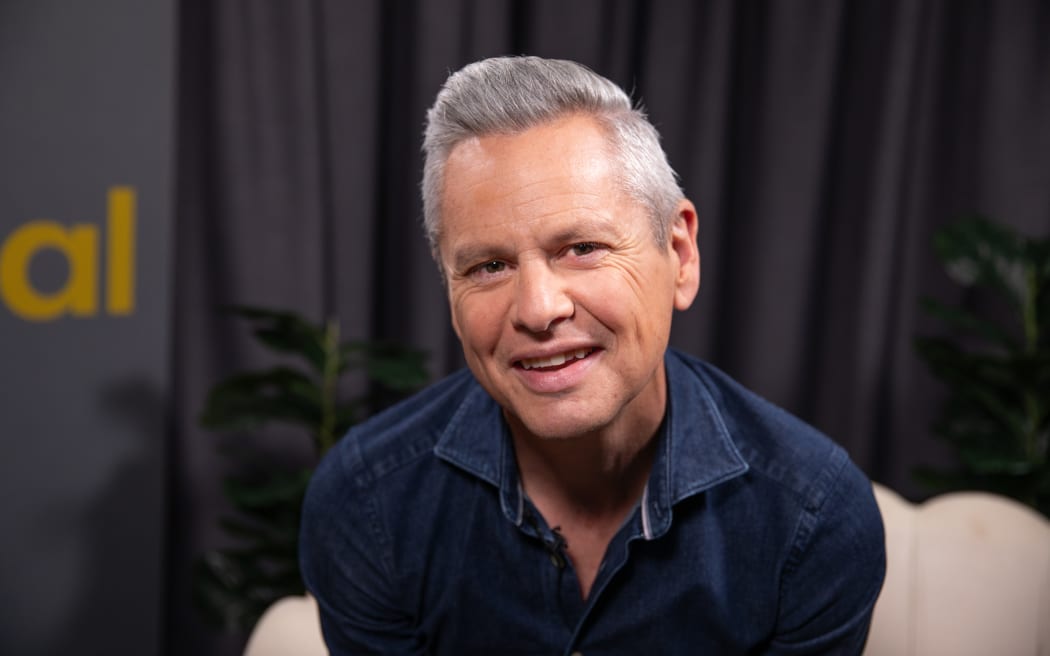
Guyon Espiner Photo: RNZ / Cole Eastham-Farrelly
"I love interviewing people. It's so much more than just a list of questions, isn't it? You're thinking about how am I going to tell this person's story? I love that about interviewing. And I love the surprises and I love the connection with people."
Dinner table debates
"I was the youngest of three boys. The older two were pretty loud and did their thing. But my dad used to host these dinner table debates, so it was quite serious. Like he had a topic of conversation. It'd be about politics or the Springbok Tour or our anti-nuclear movement or something, probably from the age of 8, 9, 10, certainly through those years and a bit older. And that's where I developed this interest in politics and I guess the media and just stuff that was going on in the world. You had to have your facts straight."
"[My dad] just wanted us to engage and debate and talk about the world. And I think because he worked a lot and was really busy and didn't engage with us for some of that time. The dinner time in those days was the time where you had your korero, you had your wananga, basically."
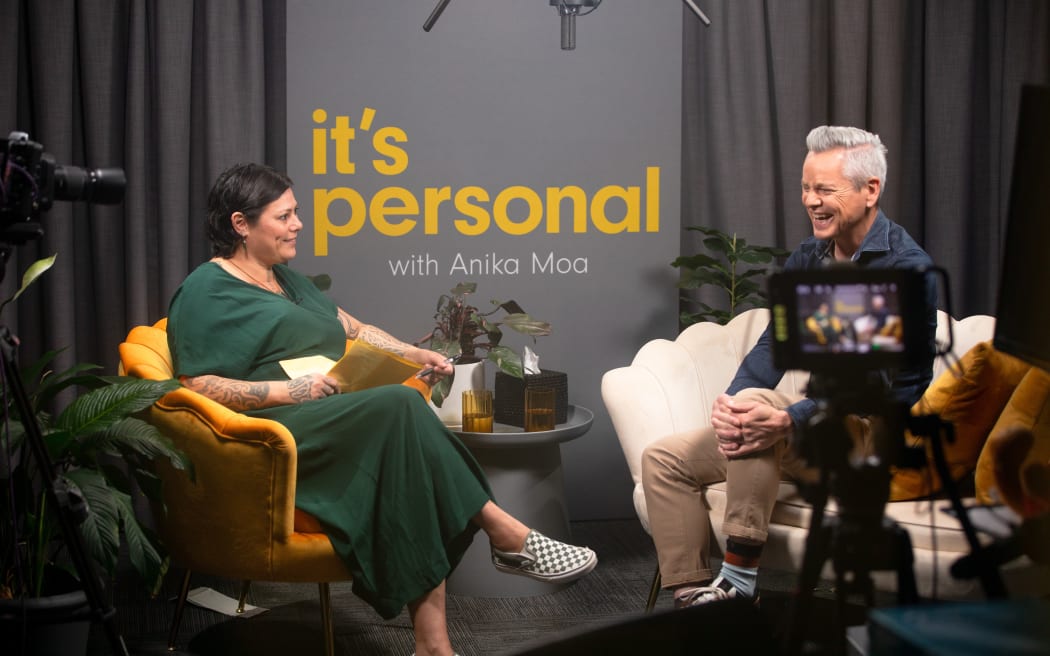
Guyon planned to be a writer from his early teens. Photo: RNZ / Cole Eastham-Farrelly
Writing and Politics
"Sport was a huge thing for me, and it was cricket and soccer for me in those days. But then my first big memory of what my future might look like was... we had a short story writing competition. I was 15 and I still remember the English teacher, who was pretty hard-ass, we were all a bit scared of her. She slammed mine down on the desk and said 'You could be a writer'."
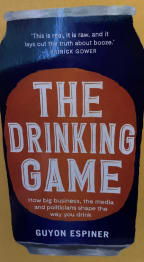
Guyon's book about New Zealand's alcohol industry was long-listed for an Ockham Award. Photo: RNZ
"I've never forgotten that. And my whole career has been based on writing. I still am a writer, whether it's writing for radio or television or a book or a script or whatever. And I am a writer, and I place a lot of that back to that point where someone said to me, 'I've got faith in you, you could do this', and someone you respected and trusted their judgment. And so from quite an early age, mid-teens, I was going to be a writer. At first, I was going to be the next Stephen King or something, but eventually that rolled into journalism.
"I'd done this English Literature degree at Canterbury University. I'd studied poetry. Poets didn't get paid much. I decided that I'd go into journalism and yeah, I'd spent the summer doing voluntary work at the local community newspaper. Finally ended up at the Levin Chronicle as a sub-editor and then they sent me up to the press gallery and I started reporting on politics from about 1998.
"Just after I started Winston Peters collapsed the first MMP government. He's in government with National, the whole thing blew up halfway through the term and it was just so exciting. The whole country was focused on parliament and it was just so invigorating. I guess that I just became quite obsessed and addicted to politics. It's like a soap opera. How's the next bit going to unfurl? What's the next bit of the story?"
Winston Peters
"He's such a survivor and he's so incredibly strategically smart about how to play his hand. You wouldn't want to play poker against him. He's utterly dominated MMP, pretty much every election since the system came in and continues to do so. It's quite incredible."
"He's very, very good as a politician, though, I would go as far as to say as you won't see a more successful politician, even internationally in a democracy. I mean, he's chosen four or five prime ministers. The extent of the influence is extraordinary. And you do that with five, six, 7% of the vote. It's amazing how he's leveraged his hand. It's quite phenomenal."
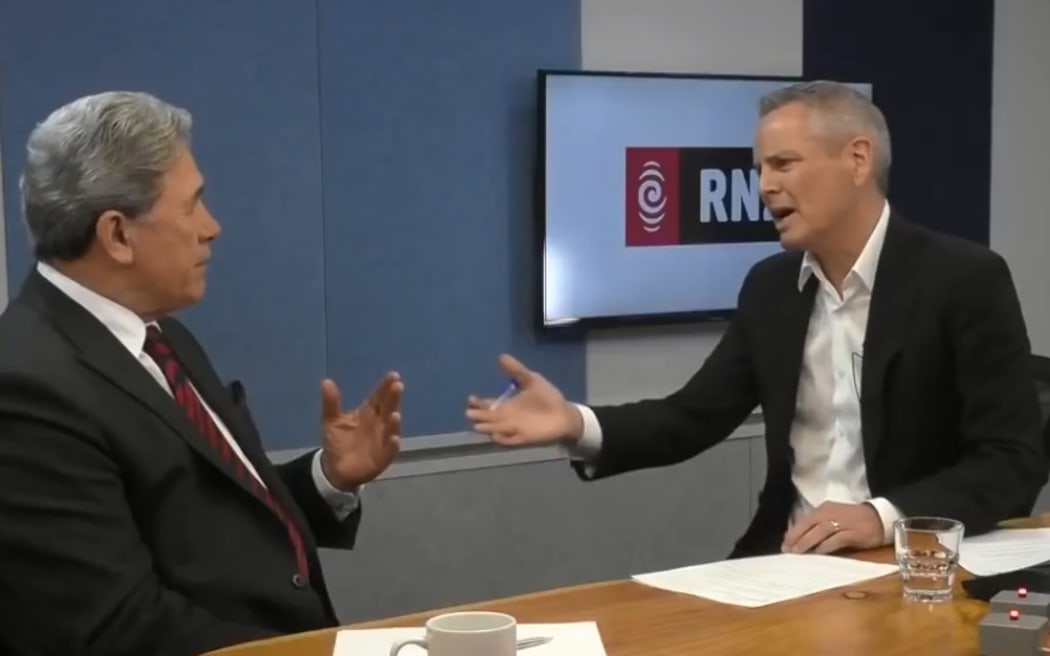
Guyon said Winston Peters has to be one of the most challenging interviewees. Photo: RNZ
"He's incredibly difficult to interview because he'll attack you and he'll start interviewing you. And so you get into this whole sort of Jedi knight sort of situation where you're trying to wrestle back control of the interview. So he's very difficult to interview."
On-screen and off-screen
"It's funny when you talk to people and you're in the media a lot and then they get to know you, they're surprised that you're actually quite introverted. I'm a relatively shy person at times, but I'm someone who knows that part of our job is to put the uniform on and do it. And if I'm going to go down the barrel of the camera, then I'm going to go down the barrel of the camera. And that's fine for me because I've learned to do that in the same way that I imagine that firefighters climb up ladders into burning buildings. You do your job. I've very much found that about journalism that, if you believe strongly in what you're doing, then that will carry you through those times of anxiety."
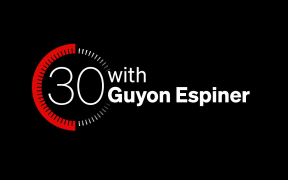
RNZ's new podcast 30 with Guyon Espiner show casing Guyon's interviewing skills launches in April. Photo: RNZ
"I probably am reflective and cautious. I'm a long-distance runner. I think a lot. But, yeah, I'm probably fairly ordinary in most respects. I watch movies, read books, play music. I'm one of these people who likes a smaller group of really close friends. It's hard to know how people perceive you, Especially if you're a little bit in the public eye, people will construct a perception around you. Like, people associate me with politics and they see me as quite a serious person."
Type-1 Diabetes
"I remember reading my daughter Nico bedtime stories and I could barely get the words out because I was so thirsty. And it's this incredible, incredible thirst. Literally, like you have just been walking through the Sahara for days. So I had that and I lost a lot of weight. And I was like, this is unusual. and also, you, are pissing all the time.
"My dad [who] is an endocrinologist and my wife at the time, who was training to be a doctor, neither of them picked it up. The symptoms were your classic ones; weight loss, blurry vision, excessive urination. My dad said, 'Oh, just drink more beer and eat more chips, you'll be fine'.
"I went to the doctor, and, he said, "I'll just get you to take this test". And so I went into this room with a nurse who just pricked my finger and I'll never forget that she went, 'Oh, my God, are you diabetic?' Because, roughly, I should have been at 5 millimoles and I was at 25, and so it was five times [over] the safe zone, if you like. I was going into DKA, diabetic ketoacidosis.
"Basically, for people with a normal functioning pancreas, the insulin will take the food and the carbohydrate and the sugars that you've ingested, and they'll put that into the cells. But for diabetics with no insulin, the sugar and carbohydrate goes straight into the blood. Your blood will effectively become acidic and poisonous, and that'll collapse your body and kill you, in relatively short order.
"That was a huge shock for me because I went from 'I don't know what's wrong with me, this is kind of weird' to a couple of hours later being in hospital with three drips in my arm."
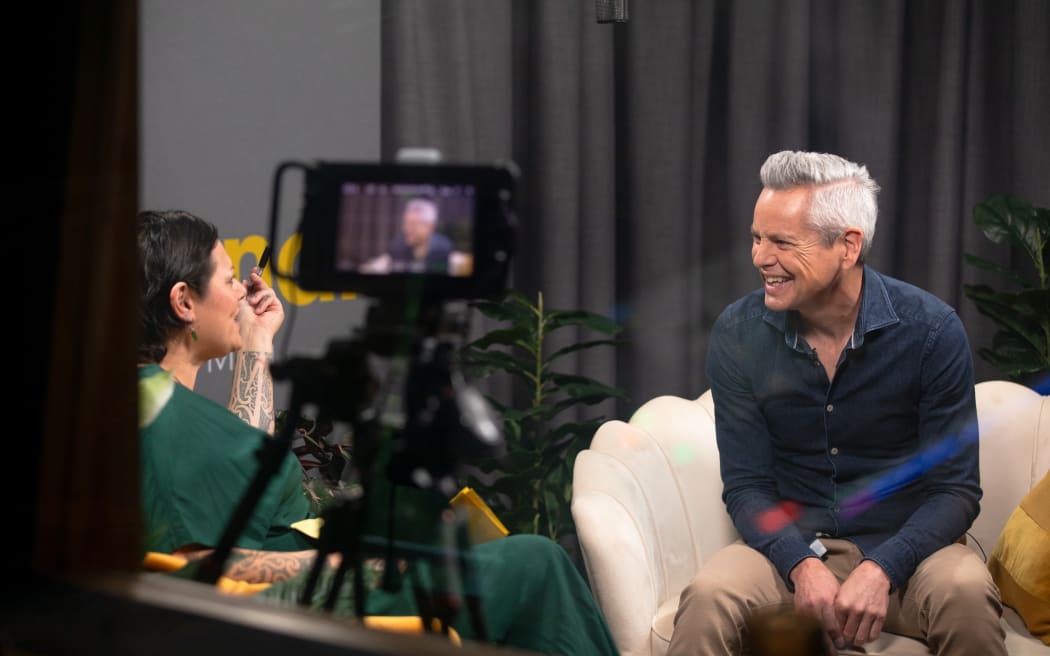
Guyon now sees having Type 1 diabetes as a positive thing. Photo: RNZ / Cole Eastham-Farrelly
"I made a pact with myself not to cry about it and I'm a bit of a crier. Like, I will cry. I made a pact with myself not to feel sorry for myself because it's lifelong, you can't cure it ever. So you have to inject insulin at least five times a day, sometimes more, for the rest of your life. And there's no holiday. So if you're going to go down the self-pity track, this is what I was telling myself, literally telling myself then that it's just a rabbit hole you are never going to come out of.
"It's a hard condition to manage because there are so many things that impact on it. For people who don't know about Type 1, you're usually taking a long-acting [insulin], which buzzes around in the background, but then you're taking a rapid-acting dose of insulin for every meal. So you've got to go, how many carbohydrates are in this meal? roughly. And then dial your dose up to make sure that there's enough insulin to cover that meal. So how do you dose for a snack evening? You can't dose for that. As a diabetic, it doesn't work. You'd be dosing tiny amounts, like four times in the night, so it just doesn't work. All of that social stuff, sometimes you just got to wear it and you know, your numbers are going to be a bit out because you just can't change the social situation. Other times you run into real trouble. Like, I know for me, if I inject rapid-acting insulin and quite soon after that even go for a walk, I'll plunge down to dangerous levels.
"I still remember the first hypo [hypoglycaemic episode] I had. It was a shudderingly bad one. I woke up at about 1:30 in the morning, utterly drenched in sweat, shaking and shivering. And for people who don't know, it's a horrible feeling, a hypo. When you're going too low, you start to drift and then you start to sweat a little bit and you shake and it feels like you're on the cusp of sort of passing out. But it's worse than that. There's a worry there, too. I don't know, it's a difficult feeling to describe. But, this was my first proper one and I ate half a packet of jelly beans and then a plate of nachos. My daughter, the next day, having heard this story, was like 'wow, what a great disease. The cure is jelly beans and nachos'."
"People don't really understand Type 1 diabetes. We're, only about 5% of the diabetic population, maybe a little more. So roughly, there might be close to 300,000 Type 2 diabetics in New Zealand and about maybe 20,000 Type 1's. So not that much is known by the general public about it. I don't think they realise the amount of maintenance that goes into it. I had a CGM on, so I knew what impact interviewing the prime minister had. I went from 5 millimoles way up to 13 or 14 just on the cortisol and adrenaline release of a combative interview with the prime minister. And that's no food, no sugar, no anything. So that's the condition. Sleep, stress, exercise, all of those things... will affect that. So you're juggling a lot of that stuff in the real world, which makes it a complex thing to manage."
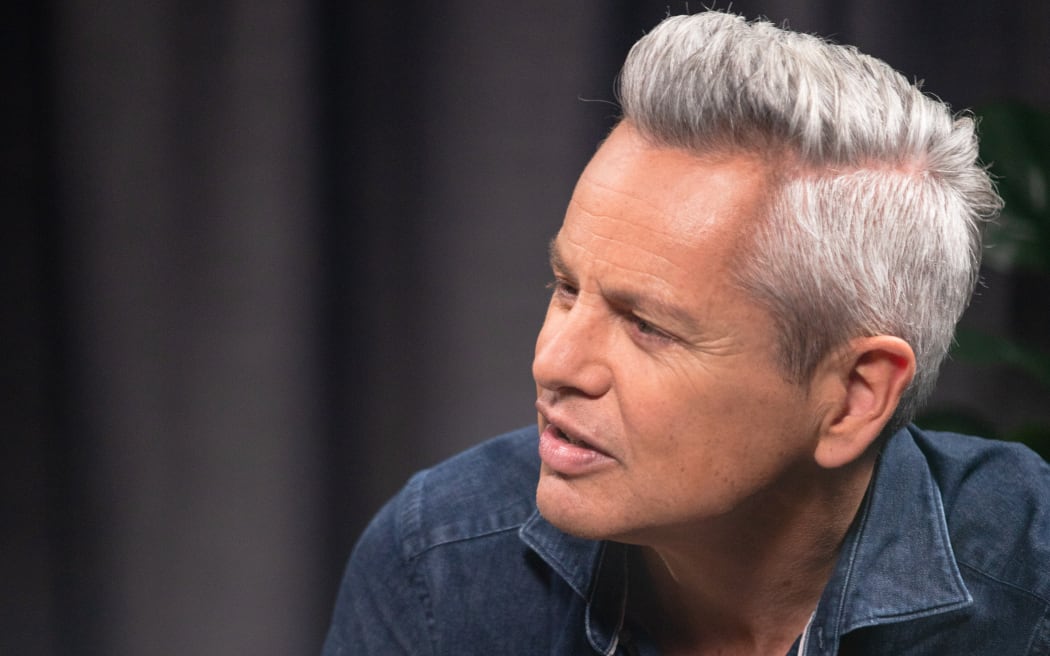
Guyon said diabetes is a very difficult condition to manage Photo: RNZ / Cole Eastham-Farrelly
"It's not many conditions where they basically say, 'Well, you go home and take a potentially lethal dose of this drug' and you just have to set your own dose. It's like, well, have a whirl and see if you can guess how much insulin you need. If you take too much, you might die, if you don't take enough over time you might go blind and get your leg cut off. And then it becomes so boring to you because you do it every day that you're just like, oh, well. I don't know if you ever do the sort of rage bolus [correction dose] thing. You're actually so high you're just trying to bring yourself down, so you're just a bit reckless and just dial it up and smash it in.
"[Now] I think I'm more empathetic. I'm far more able to put myself into the position of people who are vulnerable for whatever reason. Yeah, I think it's changed me for the good in that sense. I'm a bit of a 'silver lining' guy. Like, I'm proud of having Type 1. I'm probably going to get a tattoo. I think you've got to see it as a positive. And I reckon I'm healthier now than I was before I had Type 1. So it's my thing now. I'm diabetic. You can't argue with that. but I see it as a positive. I actually see it as a positive in my life and maybe I've kidded myself, but that's really important because if you're going to live with something for the rest of your life, you've got to be at peace with it somehow."

